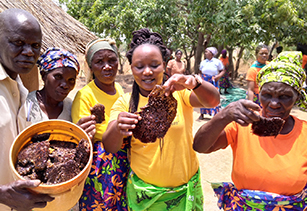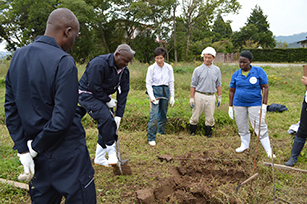Stories from the Field 7
Toward Mutual Regional Revitalization through Local Agricultural Technical Assistance
– Agricultural Support for Zambia by Farmers from Marumori, Miyagi Prefecture
In Zambia, located in Southern Africa, approximately 80% of the rural population live in poverty, and the stable production of a wide variety of agricultural products has been a challenge. Meanwhile, in the Koya area of Marumori town in Miyagi Prefecture, in addition to a declining and aging population, the radiation caused by the nuclear plant accident that occurred following the Great East Japan Earthquake in 2011 and the associated reputational damage, resulted in the local community losing its vitality and growing a sense of stagnation.
In order to overcome this situation, the Koya-Shinkokai Community, an autonomous residents’ association of the area, determined to try and develop the area into a region characterized by measures that are unique and not undertaken by other regions. Luckily, an individual who was posted to Zambia as an expert for a technical cooperation project implemented by Japan, and also lived in Marumori before the Earthquake, connected Zambia with Koya area. She suggested that, “Marumori and Zambia share a common environment that is considered unsuitable for agriculture. It might be interesting if the farmers of Marumori shared their traditional techniques with Zambia.” Following the suggestion, the Koya-Shinkokai Community consulted with Marumori town hall and asked other areas for support, hoping that, through the transfer of agricultural techniques of the Marumori residents, as well as various ideas and ingenuity, to small-scale farmers in developing countries, they may be able to contribute to poverty reduction. This was the beginning of the relationship between Marumori and the rural areas of Lusaka Province in Zambia.
Marumori made use of the Special Category of Local Government Type of the JICA Partnership Program from 2016, and conducted technical cooperation to transfer its traditional agricultural techniques to rural areas in Lusaka Province, Zambia. Short-term experts were dispatched to Lusaka Province from Marumori, and furthermore, trainees were invited to Marumori from the Ministry of Agriculture of Zambia to participate in the training of agricultural techniques while interacting with local residents.
Four subjects in the technical cooperation in Zambia and training in Marumori include: production of agricultural products for achieving diversification of agriculture, processing and storing techniques for long-term storage of the produced products, marketing to sell the products, and nutrition and cooking for the consumption of the produced agricultural products.
One of the activities undertaken in the training was beekeeping. Previously in Zambia, honey harvesting was only conducted through a method which destroys the beehives during collection, and its efficiency was very poor. Therefore, the method applied in Japan using tiered-box hives was introduced, and support was provided to enable efficient, sustainable, and safe beekeeping. The Zambian trainees also learned the importance of preparing “soil” in Marumori.

Bee keepers in Zambia who are using Japanese beekeeping techniques to collect honey (Photo: Koya-Shinkokai Community)

Conducting training on soil preparation in Marumori (Photo: Koya-Shinkokai Community)
Mr. Chipasha, Lusaka Province Agricultural Secretary, who received the training in Marumori, and currently a project counterpart says, “I knew that our outcomes would improve if we used chemical fertilizers, but because of their high cost, farmers were unable to purchase them. In Marumori, however, I learned that bamboo, a local material is used to make compost, with which high-quality soil is prepared. So we made use of post-harvesting corn chaff, a local crop in Zambia, to make compost, and we became able to increase the production yield.”
The relationship built between Marumori and Zambia through agricultural technical support discussed above went beyond unilateral technical support toward Zambia; it also brought about various changes in Marumori. Among residents who participated in the agricultural technical training, interactions with the Zambian trainees deepened the understanding of international cooperation, and sparked interest to learn more about Zambia, which led them to hold study sessions on agriculture in Zambia. Some Marumori farmers who actually traveled to Zambia have tried certain agricultural techniques now being utilized in Zambia, in Marumori.
A summit meeting between President Edgar Chagwa Lungu of Zambia, who was visiting Japan, and Prime Minister Abe was held on December 19, 2018, and a dinner party hosted by Prime Minister Abe followed, and Mr. Hoshina, the mayor of Marumori town attended the latter. The Mayor introduced and read out a letter from a high-school student, whose family had hosted a trainee, which read, “I want to go to Zambia someday to interact and experience the culture,” which brought a delighted smile to the face of President Lungu’s face.
Most of all, the motivation among the people of Marumori has changed. The techniques and ideas that they shared have enriched the lives of farmers in Zambia. This fact has served as an amazing opportunity to recognize the importance of the knowledge, techniques and experience that they have. A resident who runs a farm in Marumori and was one of the host-families of a Zambian trainee says the following:
“The current state of agriculture in Zambia is following the path of Japanese agriculture after World War II. What the Japanese had done by earnestly using ingenuity in a situation without adequate machinery is about to be undertaken in Zambia. Through these efforts, the techniques of Marumori in Japan are being passed on. This exchange with Zambia has become a wonderful opportunity to look back at the path we have taken, and return to the starting point.”
<< Previous Page Next Page >>
Main Text | Reference Statistics | Stories from the Field | Master Techniques from Japan to the World | ODA Topics
